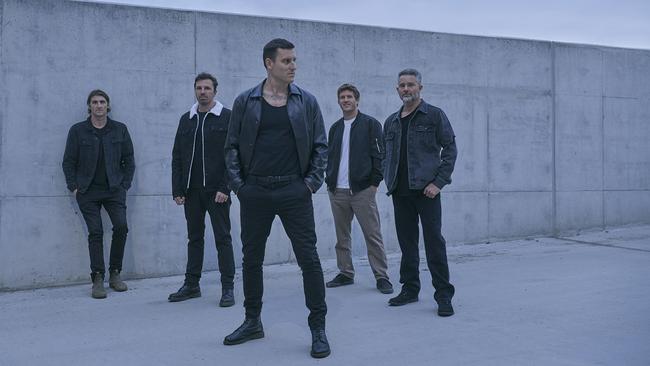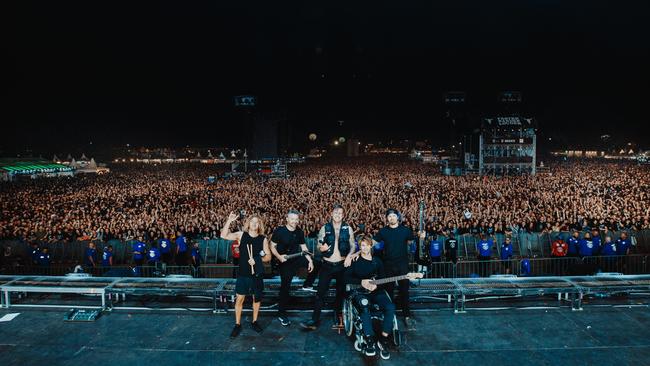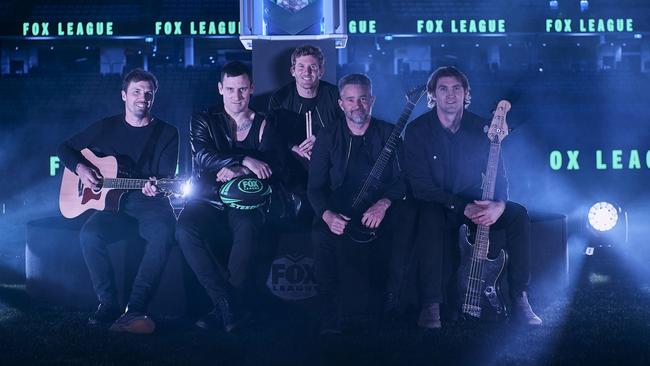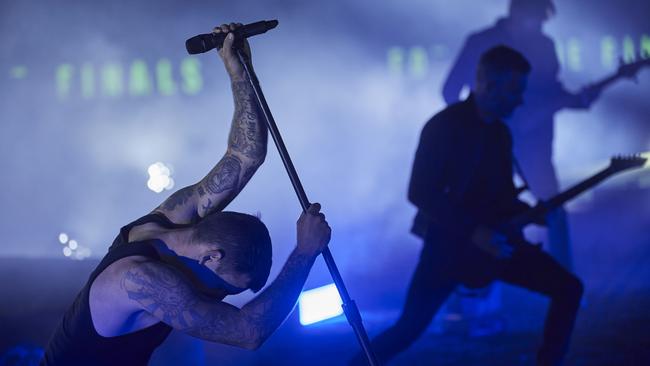Full metal racket: Parkway Drive are Australia’s loudest export
Five mates from laid-back Byron found their hard-hitting sound – and conquered the world. What will Parkway Drive do now?

For two decades, Ray and Jenny Gordon have noticed black-clad young people loitering out the front of their home. The couple aren’t celebrities by any stretch; nor is their house near Byron Bay particularly notable. From the outside, there’s no signage or plaques denoting anything of significance. Inside, however, there is a tidy collection of framed gold and platinum records hanging above the front door, as well as a couple of silver ARIA Awards. Strangely, all of these totems bear the name of their street: Parkway Drive.
What keeps all the visitors coming here is the story of the world-conquering, uncompromisingly heavy music that was first plugged in and played beneath their kitchen floorboards. Their house has become an unlikely landmark in the nation’s music history, a place so famous that the local council has long since given up on replacing the street sign that’s been stolen more than 30 times by souvenir hunters.
The Gordons live on the leafy loop of Parkway Drive in Ewingsdale, about 6km west of Byron’s town centre. Thanks to their son Ben and his friends, who have spent their entire adult lives turning their band of the same name into one of Australia’s biggest musical exports, this stretch of road has become a globally recognised brand. On a Saturday morning in late July, I meet them at the house, which Ray built with his own hands.
This is where the band members first began rehearsing in 2002, then performed before crowds of rowdy friends. Early on, they specialised in a subgenre of heavy metal known as “metalcore”: a punishing, energetic blend of breakneck drumming, distorted guitars and throat-rending vocals situated somewhere between a yell and a scream, all wrapped in lyrical angst about loves lost, deception, broken futures and standing strong in the face of adversity. It takes a certain kind of parent to welcome that racket into their home, and Ray and Jenny Gordon are those parents: permissive, tolerant, loving and open-hearted; and for their sins, they raised a boy who would become a drummer.
Over the years the couple have heard all sorts of stories from the folks who have paused at their driveway for a photo, and they light up when they hear mine. My Parkway Drive story began in high school when my friends began circulating a copy of the band’s debut EP, Don’t Close Your Eyes. The debut album Killing With A Smile, released in 2005, was the soundtrack to my Year 12 education. What really sticks in the memory, though, was the night that year when Parkway Drive performed at Bundaberg State High School. To see these five musicians and to hear their hard-hitting sound in the same room where our school assemblies took place? That cast a spell which remains unbroken.

Though Ben Gordon has long since left the family home, plenty of his stuff is stored downstairs as he’s between houses. His drum kit is set up in a corner, just as it was 20 years ago – only this time, rather than playing to impress a few local mates, Ben is practising to keep his chops up ahead of a huge European tour set to begin at an arena in Leipzig, Germany, on September 9. Plenty of adolescent musicians end up regretting the name of their band, but this one hasn’t aged at all. “I still like it,” says Ben, 36. “It’s a bit of a timeless name... it’s kind of funny when you associate it back to where it began, because in one sense, the band has become so much larger than the street.”
While today Parkway Drive is a multimillion-dollar business, Ray and Jenny fondly recall the glory days of the nascent metalcore scene in the early 2000s. “Having all the other bands come and stay here were the best times for us,” Ray says. “Scary at first, but once we got used to it all and saw how it rolled… some guys might be six-foot-seven and menacing-looking with piercings and tattoos, but they might be vegetarian, non-alcoholic and a gentle giant.”
The Gordons’ status as keepers of the Parkway House still confers some benefits, such as hearing the band’s upcoming seventh album, Darker Still, months ahead of its release. Rather than merely tolerating the band’s music, which has evolved toward a purer heavy metal style, the couple have been happily blasting the new tunes at high volume. “I think it’s very adventurous, this one, and different to anything they’ve done before,” says Jenny. “They seem to be blessed, these boys, with the timing and choices they’ve made. I don’t think they’ve done any wrong moves yet.”

The band – guitarists Luke Kilpatrick and Jeff Ling, singer Winston McCall, bassist Jia O’Connor and drummer Ben Gordon – spent their early days taking their music around Australia, but wider horizons beckoned. In nearly six months of overseas touring in support of their debut album, they stayed in hotels just a couple of times, preferring to pull their van over to sleep out in the open beside country roads – and in one memorable instance, inside a rusting shipwreck on a beach. None of it was glamorous, but Ben Gordon kept his cameras rolling throughout and assembled the footage into a feature-length documentary released in 2009. It showed the impressive lengths to which the band members – wearing a uniform of boardshorts and thongs that kept their unfussy surfer roots on full display – were willing to go to share their music with the world.
Through trial and error, those early overseas shows – attempted naively without a record label, press, promotion or dedicated booking agents – helped seed the soil for later incursions. And American label Epitaph Records’ decision to issue their debut album in the US gave them a leg-up into the global market. Each successive album and tour has grown the fanbase to the point where Parkway Drive is now better known in parts of Europe – particularly Germany – than in Australia.
A second film, titled Home is for the Heartless, released in 2012, saw the band venture into Russia, India and China. During this journey, guitarist Jeff Ling spoke to the camera and summed up the bizarre life they’d fallen into. “I never really thought that I’d write a few riffs in my little house with my parents, and then people all over the world would start humming them,” he said, beaming. “Very unusual, quite rare. Pretty happy with that.”
A third film, Viva the Underdogs, captured the group in their mid to late thirties – by which time both guitarists were fathers of small children – and preparing for a 2019 world tour that included headlining Wacken Open Air, an annual heavy metal festival in Germany that attracts about 75,000 fans. The footage is breathtaking: a sea of people banging their heads, screaming along and moving to the band’s aggressive, melodic music. Parkway Drive’s stage show is a pyrotechnic-heavy spectacle with plenty of moving parts, including an impressive roll cage for Gordon that sees him turn through 360 degrees while drumming.
“They’re the number one homegrown metal export, AC/DC aside,” says Ian Grady, a senior executive at Sony Music Australia who works with both bands. “In Europe and America, they are doing things that no other Australian band in that space has ever done before. They’re at their peak.”
A world tour in support of sixth album Reverence saw them playing to the biggest crowds of their career, but that upward trajectory was arrested by Covid. When I visited guitarist Luke Kilpatrick at his home near Byron Bay in May last year, he was grappling with the effects of the pandemic; he told me a recent Australian tour cancellation had cost them tens of thousands of dollars, with those losses mirrored and magnified in overseas territories.
At the time, the band members were well into the final stages of writing their seventh album. Those recording sessions would take four months, finishing in January. It was major leap forward in songwriting, one that showed the strong potential to open the band up to even bigger audiences. Yet the pressure-cooker environment involved in creating this work would expose deep fissures that threatened to end Parkway Drive.
In a bluntly honest statement posted to social media in April to announce the cancellation of its North American tour, the band wrote, “We have been doing this thing called Parkway Drive for nearly 20 years. We started as kids and never looked back. It has been a wild ride, but over those years, the relentless nature of being in this band has given us very little time to reflect on who we are as individuals, who we want to be and the toll it is taking on ourselves and our friendships.
“It has always been 100% commitment or nothing. We feel the limit has been reached and we don’t want to f..k this up. The same devotion that we have put into everything before, we are now putting into processing what these 20 years have done to us. With this, we aim to grow and return stronger for what is yet to come.”
Their candour sent shockwaves across the heavy metal community, both here and abroad. Parkway Drive was admitting to deep but unspecified internal issues that threatened the band’s existence. Rumours abounded, and in a group interview in mid-August, the five members tell me what led to that surprising statement.
“The whole system of the band was broken, but it never had a chance to be fully revealed,” says Kilpatrick, 40, as his bandmates nod in agreement. “Things would happen along the way and we’d brush it under the rug. I reckon the pressure and the workload that that album put on people tipped it over the edge, where that bad communication structure was really shown to have affected a lot of people in a lot of ways.”
After eventually realising they were heading straight off a cliff if they didn’t address these concerns, the five musicians made the smart call of going to therapy together. Strange though it might seem, there is a precedent for this decision, and it involved the world’s most popular heavy metal band. In 2004, Metallica released a documentary titled Some Kind of Monster, which chronicled a fractious period in its history; filmmakers rolled cameras for 715 days in both the recording studio and in therapy sessions driven by a performance-enhancing coach. It cut so strongly against the grain for Metallica to offer a softer, kinder view on the aggressive masculinity for which heavy metal is well-known, and not everyone was thrilled; recently departed bassist Jason Newsted appeared on camera calling the decision “really f..king lame and weak”.

For Parkway Drive, the parallels with Some Kind of Monster were apparent, and Kilpatrick admits to raising the idea of filming their sessions, too. “Being the manager, I thought, ‘This could be content we could release’ – but I asked, and everyone said no,” he says.
It’s a decision they all stand by. “At the end of the day, we’re not reality TV,” says vocalist McCall, 39. The musicians’ desire to engage in tunnelling together toward the core of their dysfunction also signals a generational shift and an understanding that sunlight is usually the best disinfectant, especially when it comes to matters of mental health and miscommunication. They’ve all had friends and fellow musicians die by suicide, and they’re determined to show their peers that talking helps. “At that time, we all knew how broken the whole system was – but we were all willing to work to fight for the band,” says Gordon. “We all loved what we’ve done and what we’ve created, and we wanted it to continue.”
Hearing their enthusiasm for the therapy process and the joy they’d found in fashioning new tools, individually and collectively, to protect the longevity of this entity to which they’d devoted their lives, I was reminded of a conversation I’d had earlier in the year with Midnight Oil drummer Rob Hirst, who posited a theory for his own band’s long career. “It’s possible that some blokey bands actually survive because of what’s unsaid,” Hirst, 66, told me. “Because we’ve all said things in the past which have been hurtful, and I think you quickly learn that sometimes, it’s just better to retreat into yourself. I think stony silence can be your best friend, and I think 50-odd years of Midnight Oil is a great testament to that.”
Parkway Drive, however, had to find another way. During our group interview, the youngest member largely sits back and listens, before eventually leaning forward and saying something profound. “Being honest and vulnerable is the scariest thing you can do, but it’s also the most rewarding thing we can do,” says bassist Jia O’Connor, 35. “It’s like fertiliser for your life: what you give, you get back. And if you’re honest, you just totally connect with everything in your world more.
“It’s not something you can learn overnight; you just put little bits of honesty out in the world and see it come back to you in beautiful ways,” he adds, smiling at his bandmates. “We’re all learning that. It’s a work in progress, but it’s really exciting to see it in motion.”
Though Parkway Drive has long been well-known to rock and metal fans under 40, and has racked up chart-topping albums and ARIA awards in its genre, to this point the group has lacked a certain mainstream cut-through. Its hard-edged music and McCall’s vocal style has been perhaps too heavy for commercial TV and radio. The songwriting on the new album Darker Still might change all that, particularly its title track and third single, a ballsy, seven-minute-long ballad with acoustic guitar, a gorgeous string arrangement and a distinctive whistled melody.
On a visit to Sydney in mid-August, I’m tagging along with the band as they head to a Fox Sports filmshoot at Allianz Stadium. Parkway Drive is listed on the call sheet along with last year’s NRL premiers the Penrith Panthers and other star rugby league players. This finals series promo is a major opportunity for the band to reach people who have never heard its music. When I joke that I’ll be asking for a show of hands among the football players as to whether they’ve heard of Parkway Drive, Kilpatrick quips, “I reckon maybe three out of 20 would have heard of us – maybe Tedesco, or someone old like that.” (Sydney Roosters captain James Tedesco is 29.)
Over the next few hours, as the sunset fades to night, the unplugged band stands on the pristine playing surface and energetically mimes dozens of takes of three songs, including the new title track, all while flanked by regularly belching flamethrowers and occasional firework blasts overhead. Between takes, the Panthers players – all in their 20s – are goofing around like big kids, but some of them are already whistling that earworm melody.
Heading back to the car, McCall shares with me a quiet moment of gratitude for what has just taken place. “When you throw creativity into someone else’s world, you hope that they get it,” he says. “It’s nice when they want you to be doing what you actually do.” On the ride back to their hotel, Ling, 39, says, “That was epic. It literally sunk in on me three-quarters of the way through, standing there: ‘Oh, actually, this is kind of massive.’ Towards the end, I had a full nostalgic flashback of sitting there, with my grandparents, watching the footy when I was a little kid.”
The NRL finals run all through September, but the band won’t be sitting down together to watch any of those games live. Instead, they’ll be in another time zone, playing these songs for real across Europe while undertaking their first world tour in three years. Before talk turns to dinner, their debrief of the past few hours ends with Kilpatrick making an observation that may soon be turned on its head. “Those sports players knew nothing about us,” he says, grinning.
Darker Still is released on September 9.


To join the conversation, please log in. Don't have an account? Register
Join the conversation, you are commenting as Logout